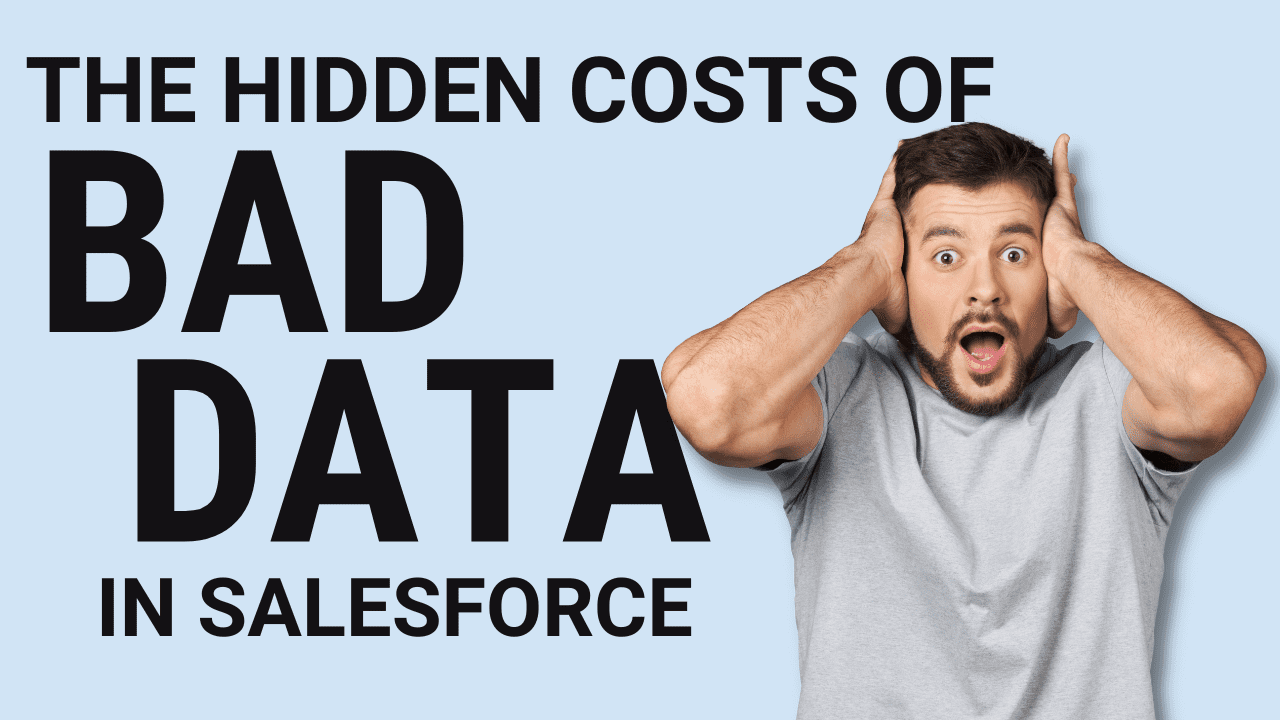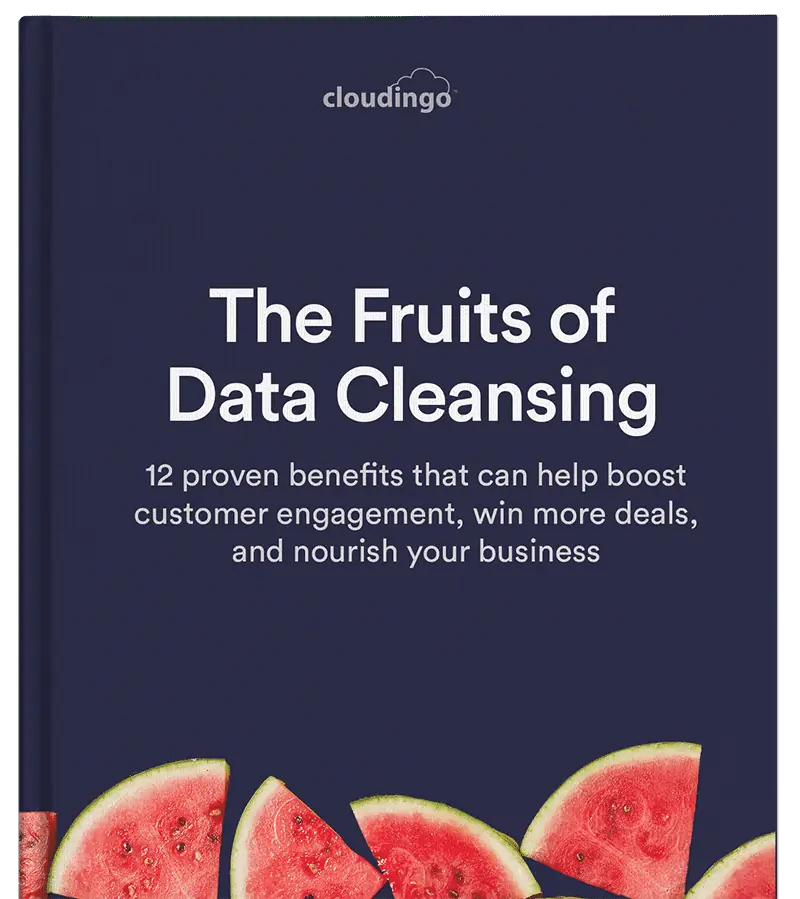The Hidden Costs of Bad Data in Salesforce

As a Salesforce Admin, you know that data accuracy and quality are essential for the successful planning, forecasting, and decision-making.
Good data can provide deep insights into trends in customer behaviors, product popularity, and other key metrics – all of which support high-performing teams and businesses.
But what about the hidden costs that bad data can bring?
While it can be challenging to put a tangible value on these losses, ignoring them carries risks that could impact performance across your entire organization.
In this blog post, we’ll explore the often overlooked impacts of poor-quality data in Salesforce – from wasted time to lost revenue opportunities – so you better understand how important it is to eliminate inaccuracies quickly!
Inaccurate Data Can Lead to Poor Decision-Making.
One of the most apparent impacts of poor data quality is that it can lead to bad decision-making. If the data you’re basing your decisions on is inaccurate, then there’s a good chance that those decisions will also be inaccurate. This can ripple effect throughout your organization, as bad decisions can lead to missed opportunities, wasted resources, and decreased productivity.
Examples of how inaccurate data in Salesforce can lead to poor decision-making
1. Overstocking inventory
If a company has too much inventory, it ties up working capital that could be used elsewhere. This can happen if Salesforce data indicates a product’s demand is higher than expected. As a result, the company may order too many products, leading to excess inventory.
2. Underestimating demand
Another way that inaccurate Salesforce data can lead to poor decision-making is by underestimating demand for a product. This can cause a company to miss out on sales and revenue opportunities. Additionally, it can lead to stockouts, which can frustrate customers and damage the company’s reputation.
3. Hiring too Many employees
If Salesforce data indicates that a company is proliferating, the company may make the mistake of hiring too many employees. This can lead to excessive payroll costs and inefficiencies in the workplace. Additionally, if the growth doesn’t materialize, the company may be forced to lay off employees, which can be costly and disruptive.
4. Making poor marketing decisions
Inaccurate Salesforce data can also lead to poor marketing decisions. For example, suppose a company mistakenly believes that a specific demographic is its most significant customer base. In that case, it may direct its marketing efforts towards that group even though they are not interested in the product. This can waste valuable time and resources.
5. Failing to plan for growth
If a company fails to plan for growth, it may find itself in a difficult position when its sales start to increase. For example, if a company doesn’t have enough warehouse space to accommodate increased inventory levels, it may have to rent additional space at an inflated cost. Additionally, the company may not have enough staff to handle the increased workload, leading to disruptions in its operations.
Outdated Data Can Lead To Missed Opportunities.
Another impact of poor data quality is that it can cause you to miss out on opportunities. If your data is outdated, you may not be aware of new trends or industry changes that could benefit your business. Additionally, if you’re not keeping your data up-to-date, you may not be able to take advantage of new features or products that could improve your business.
Examples of missed business opportunities based on unreliable Salesforce data:
1. Inaccurate lead scoring
If your Salesforce data is inaccurate, your lead scoring will also be. This can cause you to miss out on opportunities with potential customers who may have been interested in your product or service.
2. Incorrect customer segmentation
Incorrect customer segmentation can also lead to missed opportunities. You may miss out on valuable leads if you’re not correctly identifying your target market.
3. Poorly timed sales and marketing campaigns
If your Salesforce data is unreliable, it can lead to poorly timed sales and marketing campaigns. This can cause you to miss out on potential customers who could have been interested in your product or service.
4. Ineffective territory management
Ineffective territory management can also be a result of unreliable Salesforce data. If you’re not correctly identifying your target market, you may miss out on valuable leads in certain territories.
5. Missed cross-selling and upselling opportunities
Unreliable Salesforce data can cause you to miss out on cross-selling and upselling opportunities with existing customers. If you’re not correctly identifying your customer’s needs, you may be missing out on an opportunity to sell them additional products or services that they would find valuable.
Poor Data Quality Can Waste Time and Resources.
In addition to missing out on opportunities, poor data quality can also waste time and resources. If you’re spending time cleaning up inaccurate or duplicate data, then that’s time that could be spent on more productive activities. Additionally, if you’re relying on outdated data, you may invest in products or services that are no longer relevant.
Examples of wasted company resources due to inaccurate Salesforce data:
1. Inaccurate data leads to wasted marketing resources.
If a company’s Salesforce data is inaccurate, it can lead to a waste of marketing resources. For example, suppose a company sends out a direct mail campaign to a list of customers that includes inaccurate data. In that case, the resources used to create and send the campaign and the customer’s time will be wasted.
2. Inaccurate data leads to wasted sales resources.
If a company’s Salesforce data is inaccurate, it can lead to a waste of sales resources. For example, if a salesperson makes a sales call to a customer that does not exist or if the customer’s contact information is incorrect, it will be a waste of the salesperson’s time.
3. Inaccurate data leads to wasted customer service resources.
If a company’s Salesforce data is inaccurate, it can waste customer service resources. For example, suppose a customer calls customer service with an issue, and the customer’s information is not in the system. In that case, the customer service representative will have to spend extra time researching the issue.
4. Inaccurate data leads to wasted it resources.
If a company’s Salesforce data is inaccurate, it can lead to a waste of IT resources. For example, if IT needs to troubleshoot an issue and the data they are working with is incorrect, it will take longer to resolve the issue.
5. Inaccurate data leads to wasted management resources.
If a company’s Salesforce data is inaccurate, it can lead to a waste of management resources. For example, if managers need to make decisions based on incorrect data, they may make decisions that are not in the company’s best interest.
Poor Data Quality Can Damage Your Reputation.
Another potential impact of poor data quality is damage to your reputation. If customers or clients are repeatedly given inaccurate information, they may question your competence and trustworthiness. This can lead to lost business and decreased revenue. Additionally, if you’re sharing inaccurate data with other businesses or organizations, they may also question your credibility.
Examples of how a company’s reputation can be damaged due to poor data quality in Salesforce:
1. Poor decision making
A company relying on unreliable Salesforce data can lead to poor decision-making. The company may make decisions based on inaccurate information, which can hurt the business. In some cases, the company may even make decisions that are harmful to the business.
2. Loss of customer trust
Another way that unreliable Salesforce data can impact a company’s reputation is by causing the loss of customer trust. If customers believe that the data provided by the company is inaccurate, they may lose faith in the company and its products or services. This can lead to a decline in sales and revenue for the business.
3. Damage to relationships with partners
Unreliable Salesforce data can also damage relationships with partners. If the company provides inaccurate data to its partners, they may become frustrated and no longer want to work with the company. This can lead to a loss of business and damage the company’s reputation.
4. Increased costs
Unreliable Salesforce data can also lead to increased costs for the company. The company may need to spend more money on marketing or customer service to offset inaccurate data’s negative impacts. Additionally, the company may need to invest in new technology or processes to improve its data accuracy.
5. Regulatory problems
Finally, unreliable Salesforce data can also lead to regulatory problems for the company. If the government or other regulatory bodies find out that the company is providing inaccurate data, they may take action against the business. This could include fines or other penalties, damaging the company’s reputation.
Poor Data Quality Can Lead to Compliance Issues.
If you’re required to comply with specific regulations or standards (such as HIPAA or PCI), poor data quality can put you at risk of non-compliance. This could lead to fines or other penalties, damaging your reputation and bottom line. Additionally, if customers or clients know that you’re not complying with regulations, they may be less likely to do business with you.
Examples of how companies can encounter compliance issues due to inaccurate Salesforce data:
1. Failing to comply with regulatory requirements
One of the most common compliance issues companies face is failing to comply with regulatory requirements. Government agencies set regulatory requirements to protect consumers and ensure businesses operate fairly and safely. If a company fails to comply with these requirements, it may be subject to fines or other penalties.
2. Failing to comply with industry standards
Another compliance issue that companies may face is failing to comply with industry standards. Professional organizations set industry standards to promote best practices within a particular industry. These standards are not always mandatory, but companies that fail to comply with them may be at a competitive disadvantage.
3. Failing to comply with contractual obligations
Another compliance issue that companies may face is failing to comply with their contractual obligations. Contractual obligations are typically outlined in service contracts, vendor contracts, or other agreements. If a company fails to meet its contractual obligations, it may be sued by the other party or be required to pay damages.
4. Failing to comply with data protection laws
Another compliance issue that companies may face is failing to comply with data protection laws. Data protection laws typically require companies to protect the personal information of their customers or employees. If a company fails to comply with data protection laws, it may be subject to fines or other penalties.
5. Failing to comply with anti-corruption laws
Another compliance issue that companies may face is failing to comply with anti-corruption laws. Anti-corruption laws are designed to prevent businesses from engaging in bribery or other forms of corruption. If a company fails to comply with anti-corruption laws, it may be subject to fines or other penalties.
Poor Data Quality Can Cause Frustration and Confusion
Another negative impact of poor data quality is frustration and confusion among employees. If employees constantly have to deal with inaccurate or duplicate data, it can make their jobs more complex and less enjoyable. This can lead to increased turnover as employees look for jobs at other companies where they won’t have to deal with these issues.
Examples of how poor data quality in Salesforce leads to frustration and confusion among employees:
1. Incomplete or incorrect data
One of the most frustrating things about working with Salesforce data is when it is incomplete or incorrect. This can make it difficult to get an accurate picture of your sales pipeline and lead to missed opportunities or lost deals.
2. Duplicate data
Another frustrating issue that can arise with Salesforce data is duplicate data. This can happen when multiple users enter data into the system or when data is imported from another source. Duplicate data can make it difficult to get an accurate view of your sales pipeline and lead to confusion and frustration.
3. Out-of-date data
Another common issue with Salesforce data is that it can become out-of-date quickly. This can happen for various reasons, such as when a deal changes hands or new information is added to the system. Out-of-date data can lead to frustration, confusion, and missed opportunities.
4. Lack of data standardization
One of the biggest challenges with Salesforce data is often a lack of data standardization. Different users may enter data in different formats, making it difficult to get a clear picture of your sales pipeline. Additionally, a lack of data standardization can lead to confusion and frustration when analyzing your data.
5. Data migration issues
Finally, another common issue that can occur with Salesforce data is data migration issues. This happens when you try to move your data from one system to another, such as from an older version of Salesforce to a newer version. Data migration issues can lead to lost data, frustration, and confusion.
Summary
Your data is the foundation of your Salesforce implementation. if that data is bad, it will impact every single process and user in your org. Having accurate, consistent, and timely data isn’t just a best practice—it’s essential for having a productive organization.
Still not convinced?
Download this free ebook from Cloudingo, to see real-world examples of how poor data can torpedo productivity (and cost you big time), and what you can do to resolve your data quality issues in Salesforce.
POST SPONSOR:

Cloudingo
CLEAN UP SALESFORCE AND HAVE DATA YOU TRUST!
Salesforce is excellent for managing customers. But it misses the mark when it comes to data quality.
Inaccurate data in Salesforce can lead to lost opportunities, incorrect performance metrics, and wasted time.
Snag this FREE ebook and learn how Cloudingo can help your company clean up your Salesforce data painlessly!
🔥 SUBSCRIBE! 🔥

Get practical Salesforce advice in your inbox!
Feeling overwhelmed by everything you have to do as a Salesforce Admin?
I know how it feels.
I created the FREE Brainiate Newsletter – to help you stay up-to-date with the latest Salesforce news, advice, and product recommendations.
Sign up for my newsletter and get all that information right in your inbox – without having to search for it yourself. You’ll be able to focus on your projects with peace of mind, knowing you’re always up-to-date on the latest Salesforce updates.
Click the button below and sign up for my FREE Brainiate Newsletter today!







